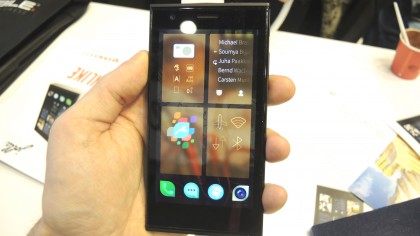Jolla: apps are making our smartphones dumb
"It's absolutely ridiculous that there was the internet and you could get everything that you wanted everywhere, and then applications took that away from you," says Dillon. "They put it into a box. And somebody controls what goes in and out of that box. It should be more open than that."
The Jolla phone uses apps - its own and Android APKs - but the bigger vision is to move away from applications as we currently understand them.
"There's not a lot of deep integration that makes it seamless for you as a user," says Dillon. "You don't think in terms of this app or that app. You think in terms of 'what do I want to do today?'.
"We have a tunnel vision with applications now - you're either in this app or you're in that app. So we started with the multitasking, so you can see all the things in your digital life at the same time."

Jolla's ambitions are rather aligned with Google Now then, something that Dillon reinforces with when we ask him where he wants to see Jolla - and other smartphones - in a few years time.
"I'd like to see it more where the smartphone is actually smart, not just running applications," says Dillon. "And where it can help you with suggestions, saying things like 'you haven't called your mother in a while' or 'Did you know that, while you're travelling, one of your favourite shops is just around the corner?'.
"Make it user focused instead of having companies that are just pushing their advertising to you and pushing things that aren't always relevant, even though they know everything about you because they're selling your data."
Sign up for breaking news, reviews, opinion, top tech deals, and more.
Ok, so more like Google Now without all the data-gobbling. But whether or not Jolla can truly shake up the smartphone market, it deserves recognition for going against the grain and attempting to inject life into a market that's becoming increasingly unexciting and predictable.
"Everything now is being pushed down to commodity level because it's all the same," says Dillon. "So the operators are a commodity, all they are is an internet connection now, there's no reason to pick one or the other than price.
"The hardware is in two segments: there's this low-end stuff that doesn't really offer anything new, then there's this high end so stuff that's all about flash. It's about make it bigger, make it shinier, add more processor cores..
It's the perfect time to create something that's different."
- TechRadar goes hands on with the Jolla phone

Hugh Langley is the ex-News Editor of TechRadar. He had written for many magazines and websites including Business Insider, The Telegraph, IGN, Gizmodo, Entrepreneur Magazine, WIRED (UK), TrustedReviews, Business Insider Australia, Business Insider India, Business Insider Singapore, Wareable, The Ambient and more.
Hugh is now a correspondent at Business Insider covering Google and Alphabet, and has the unfortunate distinction of accidentally linking the TechRadar homepage to a rival publication.